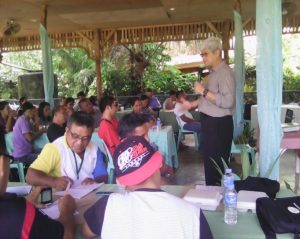For the last 20 to 30 years, farmers in the Philippines have been practicing a chemical – based agricultural production strategy. Despite the high cost of these inputs, there have been detrimental effects from the use of agricultural chemicals (e.g. synthetic fertilizers, pesticides, growth regulators, growth hormones and anti-biotic of farmers.) The farmer’s utilization of these chemicals can adversely affect the soil fertility, food quality, animal health, and natural ecosystem. Some used agricultural chemicals extensively because there are no other alternatives that would be considered practical. One reason for this is that many experts are promoting the use of agricultural chemicals as the best means of achieving the highest possible crop yields.
The predominant question now then is, “How can the rubber farmers shift from a chemical – intensive agriculture to one that is based on the utilization of natural farming system and still maintain their economic viability?” By transforming the practices of farmers who are dependent on the use of synthetic chemical fertilizers and pesticides, we can address this particular issue. However, we need to consider a paradigm shift with regards to altering their thoughts about the high cost of fertilizers and pesticides and thus provide a sufficient motivation for them to shift from chemical-based farming to natural farming system.
It is encouraging to know that there are some efforts now on the way as university researchers, the Philippine government, and private sectors will develop natural farming as an alternative to chemical-based agriculture. The realities of farming in the uplands are done naturally; furthermore, the scarcity of resource and the remoteness of their locations are major constraints for intensive cropping.
Now, the Philippine Rubber Research Institute (PRRI) has recently conducted an event entitled, “Natural Farming System Technology Seminar /Workshop” which was held at Baranggay Tambanan, Naga Zamboanga Sibugay on November 17-18, 2015. There were 35 participants coming from different municipalities and rubber cooperatives of Zamboanga Sibugay District II. The main objective of this workshop was to improve income opportunities by adopting natural farming system. The resource speakers were husband and wife, Mr. Andry Lim and Mrs. Josephine Lim.
During the workshop, the lecturers discussed and demonstrated the natural farming system technology and good agricultural practices. Principles and techniques that increase awareness and appreciation on the benefits of natural farming were also tackled. They discussed the following topics:
1. Correct usage of farming inputs
2. Principles and concepts of farming system
3. Alternatives for pest control
4. Seeds and seedling treatment and neutralization
5. Free-range native chicken production
6. Importance of housing, bedding, and drinking water
7. Soil and growth management
8. Diversity of living organisms
9. Nutritive cycle: Theory and Biological
Mrs. Josephine Lim demonstrated on making the concoction, fermentation of plant juice, and its application and effectivity.
Mr. Andy Lim stated, “Natural farming system has unleashed the most creative and most innovative men and women from the Local Government officials in the country. It created a common ground and unified knowledge and understanding about the many aspect of natural farming system technology. It internalized the reason for the need of improving natural farming industry as a whole. It created awareness and interest and interest on the need to sustain subprojects that are geared to natural farming technologies.” This development approach will have an great impact on rubber plantation. Since these activities involved the use of crops, livestock, and other indigenous materials and skills of farming experts for the benefit of rubber farmers increased income.
The Philippine Rubber Research Institute (PRRI) adopted the natural farming program for farmers. Rubber farming makes them responsible for their activity because they now have a clear understanding of the principles of natural farming and following the law of nature and respect for Mother Nature. Here in Zamboanga Peninsula, rubber production is considered to be one of the most valuable occupations in the province. This simple job serves as the bread and butter of a number of families. Unfortunately, it stands a little over one percent of the entire world’s production as of 2012. By 2020, the rubber production is expected to reach 1 million hectares. PRRI is working towards making the industry better, more profitable and sustainable Philippine rubber. Despite of the current low price, there is a need for us to provide new strategies and techniques to combat this challenge. Let us adopt natural farming system into rubber farming and making production cost-efficient, thus, boosting the income of rubber famers. PRRI needs to set forth certain policy and initiatives that would promote the development of productive, profitable and sustainable natural faming systems and to ensure that this knowledge is transferred effectively to rubber farmers. (Prepared by: Allan Boy Tabigue)

Resource speaker Dr. Andry K. Lim discussed alternative ways aside from the use of synthetic fertilizers.

Dr. Lim explained to the participants on how to develop farming system technology.

Participants during the Natural Farming Technology Seminar Workshop held at Tarbemco

